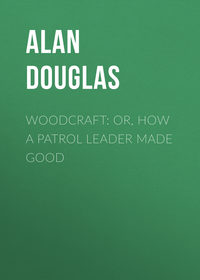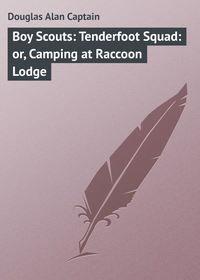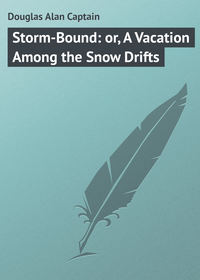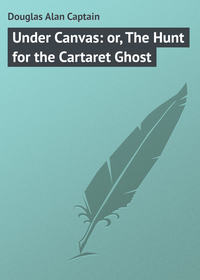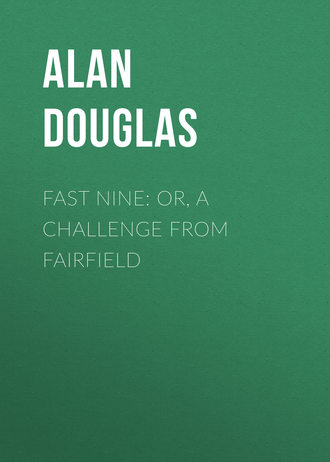 полная версия
полная версияFast Nine: or, A Challenge from Fairfield
The man looked up and waved a hand cheerily, and it gave Elmer a queer little sensation, altogether pleasant, in the region of his boyish heart to realize that that young fellow was laboring honorably there that bright morning, instead of languishing in jail with a forlorn outlook before him, thanks to the kind heart and generous impulse of the man who owned the estate. And it also pleased Elmer to feel that he, too, had had something of a share in what seemed like the reformation of Phil Lally.
And when noon came around the skies still smiled, guiltless of clouds; while a delightful breeze gave promise of a grand afternoon for the great game.
CHAPTER XIII.
READY FOR THE GREAT GAME
"What's the matter with this for a corker?"
Lil Artha, the long-legged first baseman of the Hickory Ridge nine, put this question to his mates as the big carry-all containing the team, with several substitutes, came in view of the fine field at Basking Ridge on the afternoon when the great game was to be decided.
No one tried to answer.
The reason was plain, for they were utterly overwhelmed by the magnitude of the immense crowd that had assembled to see the anticipated spirited contest between the rival teams of Boy Scouts.
In every direction were great masses of people, all decked out in their holiday attire. Girls in white and every color of the rainbow waved parasols, gay handkerchiefs, and little flags on which the name of their favorite team had been emblazoned.
"Why," gasped Ted, when he could catch his breath, which had been actually snatched away from him by his amazement, "there must be a thousand of them here!"
"Better say millions and be done with it," laughed Red, eager for the fray.
"The whole county has turned out to do us honor, it seems," remarked Matty.
"And because of that, fellows," put in Elmer, "every Hickory Ridge scout ought to shut his teeth hard and make up his mind to win out; never to give up; and if he makes an error, do something right afterward to atone for it."
"Right you are, my boy," remarked Mr. Garrabrant, the efficient scout master, who fortunately was enabled to accompany the boys on this trip. "I was just going to say something along those same lines myself when you took the words out of my mouth. Hickory Ridge is watching you to-day, fellows; and Hickory Ridge expects every one of her sons to do his duty. Nobody can do more."
"Well, here we are, safe and sound," remarked Ty, as the vehicles came to a stop in the midst of the tremendous throng.
"Wow! listen to that, would you?" said Toby, as cheers started that seemed to rock the very earth.
The team from Fairfield had arrived some time before. They were busily engaged in building up their batting abilities by sending out hot ones that a number of local baseball enthusiasts caught in the field.
"Say, they're a lot of hustlers, now, let me tell you," declared Red, as he stood for a minute watching the actions of the others.
"Oh, they're big enough," remarked Lil Artha, indifferently; "but since when did size count for everything in baseball? You'll see the smallest fellow step up and knock out a homer, where a big stiff like me swings at three wide ones and sits down on the mourners' bench."
"Like anything you will," said Red, disdainfully.
"The pitcher who strikes you out has got to get up early in the morning, that's what"; since the gaunt first baseman was noted for his keen batting eye and could pick out a "good one" as well as any in the business.
"Come on, fellows, let's get busy," called Elmer, as he passed a ball to one of the others, and in almost a twinkling the whole bunch was tossing back and forth, gradually widening out.
Then a few of them fraternized with their opponents, as they happened to know most of the Fairfield fellows, and in this way a number of Elmer's team found a chance to take a turn at bat.
It was a sight that would not soon be forgotten in Basking Ridge. They certainly did have a splendid field for the sport; and the grand stand was a little gem in its way, but on such an occasion it did not begin to hold one fifth of the spectators who would have been glad of a chance to use it.
"Ground rules to-day, that's sure, Elmer," remarked the field captain of the Hickory Ridge team, as he stood alongside the pitcher, receiving the ball at intervals and returning it.
"That goes, without a doubt," replied Elmer, as he surveyed the mass of people packed around the diamond and the field. "And if I were you, I'd look up Matt Tubbs right away, so as to have that matter settled."
"Sure," said Lil Artha. "And I reckon that a hit into the crowd will stand for two bases and no more."
"As near as I can see, there's only one place anybody can hit to-day for a homer," declared Elmer, again surveying the field.
"Tell me where that is," remarked Lil Artha, "because I want to know. As field captain, it's my business to know; and as an humble batter, I might want to look that way before the game grows cold."
"You'll notice that none of the crowd seem to want to pack upon the right of the center field," Elmer went on in a low tone. "If a batter could send one out there like hot shot, that managed to escape the fielder, it would never stop on that little down grade till he'd made the rounds."
"Aw, thanks!" replied Lil Artha, dryly. "I'm sorry that my specialty happens to lie off there in left; but I'm going to twist around a little and keep that down grade in mind. Perhaps, who knows?" and he winked at Elmer in his comical way as he hurried off to confer with Matt Tubbs.
Home Run Joe Mallon, the professional ball player who was home at Basking Ridge nursing a broken arm, was on the spot, ready to serve as umpire. He had been well known in this capacity before he broke into the big league, and people used to say that he seldom erred in his decisions. They called him "Honest Joe" at the time he umpired, and few ever disputed his decisions. He might make a slight slip, but everyone knew he decided plays just as he saw them and the rabble of the bleachers never had any weight with him.
Elmer and Mark found a chance to get together and confer where they could speak their minds without others hearing.
Later on they expected to warm up for business, but it was too soon, as yet. After the rest of the team had started in on their fifteen minutes of practice it would be time enough for Elmer to try out a few of his curves and drops.
"I had Jasper Merriweather show me the fellow," Elmer remarked.
"Meaning our slick friend, Lon Braddock?" questioned the catcher.
"Yes. That's Lon talking to Henry Cobb, who plays third base for the Fairfield nine. And Mark, between you and me, I don't just like his face or manner."
"Same here, Elmer," declared the other quickly.
"He's got a tricky way about him, and I warrant you that fellow is going to give Matt Tubbs more trouble than all the rest of his team combined. Look at him chuckling now. Ten to one he's telling Cobb how he's got the Injun sign on our signals, and what great stunts the Fairfield batters are going to do with your curves and slants."
"Well, you know the old saying to the effect that the fellow laughs hardest who laughs last; and Mark, believe me, we're going to have that privilege. But I hope you won't give it away by jeering the unlucky batter when he nearly kills the air swiping at one that is away beyond the end of his stick."
"I'll try and keep a straight face, Elmer," chuckled Mark. "Got a piece of alum in my pocket right now, and before the game begins I mean to rub it over the side of my mouth, so as not to be able to crack a smile. There go our boys out in the field for practice."
"Well, perhaps we'd better get a move on, then, and pass a few, though after our morning work I don't feel much in need of it, Mark."
As Fairfield had already taken the field, and there was now only fifteen minutes left before game would be called, the battery of the rival team was also hard at work when Elmer and Mark started in.
Of course, neither pitcher tried his best in that preliminary bout. Well did they know that eager eyes were watching them for points connected with their delivery, and that these would be quickly seized upon for an advantage. Hence they contented themselves, as a rule, in sending in swift, straight balls simply to warm up.
Hickory Ridge had batted against Matt Tubbs for several seasons, and yet never had a game been actually finished. Up to the present they had always broken up in a beautiful row, in which both sides claimed victory.
Elmer had pitched part of a game the preceding summer. At the time he had proven so much of a mystery to his opponents that, seeing prospective defeat staring his team in the face, Matt Tubbs had found some pretext for disputing a decision of the umpire to end the battle.
But since that time the Fairfield team had been greatly strengthened, and in all their games thus far this season they had beaten their opponents easily.
On a neutral field, with a firm umpire directing matters and with all the participants members of the Boy Scouts, it was believed that for once a game between these old rivals might be threshed out to a conclusion.
Many shook their heads, remembering the Matt Tubbs of old and prophesying all manner of evil things that might spring from this bitterly contested game. Others, who knew something of the principles governing true scouts, tried to take heart of hope and believe that there must have been a great awakening in the former bully. But even they admitted that "the proof of the pudding lay in the eating of it," and that they would be better satisfied when the end came without a riotous demonstration on the part of Fairfield and Cramertown.
The Hickory Ridge boys seemed to acquit themselves very well in practice. Numerous dazzling pick-ups were made by the infield that brought out roars of applause from the big crowd; while those tending the outer gardens had to make rapid speed and do some air-jumping in order to drag down the flies that were sent out in their direction.
Having seen both teams at work, the crowd hardly knew which looked the better. And, as in most cases, it ended in a strictly partisan division, each town standing loyally by its athletes, with Basking Ridge about equally divided.
Finally the Hickory Ridge fellows were called in from the field. The time for practice had expired, and presently, when a few little details were gone through with, real business would begin.
The two teams lined up for the fray in this order:
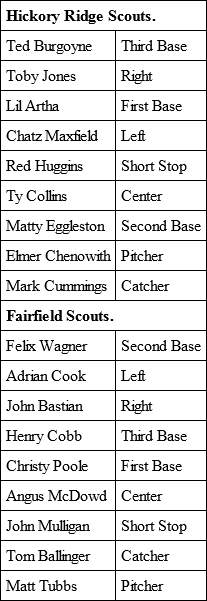
There was a wave of talk passing over the throng as the two captains conferred. It was understood that they were deciding finally on the ground rules that must prevail, on account of the mass of spectators pushing in on the lines. All Basking Ridge's local police force was on the spot, but half a dozen good-natured officers are next to useless when up against thousands; in contests of this sort dependence must be placed on the spirit of fair play that is generally a part of baseball crowds, especially in smaller towns, where the players are known.
"The game is called; now for it!" yelled the nearest spectators, as they saw the umpire pick up his mask and step forward to announce the batteries, while the Hickory Ridge players started for their positions.
"And we have the last look-in, as we take the field first!" howled an enthusiastic follower of the team that looked to Elmer as the keystone of their arch.
CHAPTER XIV.
HOW THE FIGHT WENT ON
"The batteries for to-day's game will be: Chenowith and Cummings for Hickory' Ridge; Tubbs and Ballinger for Fairfield!"
The last word of the umpire was drowned in a roar, and the air seemed filled with waving hats, parasols of gaudy hues, handkerchiefs, and anything else that could be utilized for the occasion.
Then came a dead silence. Every eye, doubtless, was at that moment riveted on the young pitcher of the nine in the field as he sent in a few straight ones to his catcher, just to find the plate.
"They say he's got speed to burn," remarked one Basking Ridge spectator who had never before seen Elmer pitch.
"But the best thing he's got is a nasty little slow drop that's running Christy Matthewson a close race," commented a second one.
"Oh, shucks!" laughed a Fairfield boy close by; "wait till you see how our fellows fatten their averages on those nice little drop balloons. We've heard a heap about 'em, and have been practicing at hitting all such. Why, mark my words, before the end of the fifth inning this wonderful Elmer will be so tame he'll be eating out of the Fairfield players' hands."
"Wait and see. The game is young," called another fellow.
"I should say it was, when the first ball hasn't been sent over the rubber yet," declared still a fourth spectator.
"Play ball!" shouted the umpire, as he settled himself back of the pitcher.
Again came silence as Elmer, receiving the ball from first base, rubbed it on the leg of his trousers preparatory to shooting the first one over.
A shout went up. Wagner, the stout second baseman, had failed to judge correctly and "one strike" was recorded against him.
"But did you hear the swish of his bat?" demanded the Fairfield enthusiast. "Say, if ever he leans up against one of those curves, good-by to the ball, that's all."
"Sure! Only let him lean; that's what we say. He just can't do it on Elmer," answered a devoted Hickory Ridge lad near by.
Then came a second strike, followed by a foul. Wagner looked puzzled. Evidently he was watching the pitcher closely and going by his signals to the catcher, but as these had been turned almost completely about, he mistook every one of them and was letting himself out at what would easily have been called balls.
When for the third time he had a strike called on him the batter retired amid a storm of mingled cheers and catcalls. He had allowed a good ball to pass by him without making an effort to strike, believing from the gestures of Elmer that it was meant to be a wide one.
Wagner went off, shaking his head. He was evidently mystified, and the Fairfield crowd began to sit up and take notice.
"That's a funny thing for Felix to do," they commented. "He's the most reliable batter in our bunch, and yet he acts as though he didn't know a good one from a wide curve a foot from the plate. Say, that pitcher must have him locoed."
Next came Adrian Cook. He, too, was known as a hitter, and when he stepped to the batter's line the fielders were accustomed to backing off, ready for a terrific drive.
But it began to look as though Adrian must have forgotten to bring his batting clothes along with him, judging by the way he swiped at the empty air twice, and then managed to pop up a measly little foul that Mark easily smothered in his big catcher's mitt.
"What are we up against?" the Fairfield crowd began to say.
"Oh, that's nothing," others put in, more confident. "The boys will wake up after a little. You wait and see them take his number. Once they begin, the air will be full of balls and those fielders' tongues will hang out of their mouths from chasing them!"
So they talked, as all partisan crowds do, while Bastian toed the mark. He looked particularly dangerous as he half crouched there watching Elmer like a cat might a mouse he expected to devour.
But Bastian was no better than the others who had preceded him. He had two strikes called on him by the umpire without having even made a motion.
"Hey, wake up! Get out of that trance. Jack! He's feeding you good ones and you don't know it! Now, altogether, and send one out in center for a homer!"
Jack did his best, just as Elmer knew he was bound to. He believed he saw the pitcher signal that he meant to cut the middle of the plate with the next; when in reality it was intended to be a wide one. And so he too perished, amid the cheers of Hickory Ridge, and the groans of Fairfield.
By the time another chance at bat came for Matt Tubbs's band, there would be excited conferences going on. These heavy batters would soon awaken to the fact that the signals given to them by Lon Braddock were all wrong; and that by trying to take a mean advantage of Elmer they were only digging their own graves.
Matt Tubbs was certainly at his best that day; and he had always been known as a clever pitcher. Ted followed the fate of the three Fairfield batters, and along the same road, for he struck out.
Toby lifted a great fly that soared away up in the air. He was making for second under full steam, believing that McDowd out in center field could never get under the ball, when the cheers that broke forth announced a clever catch. And Toby was compelled to walk back to the bench, resolving that another time he would try to put it far over McDowd's head.
Lil Artha succeeded in placing a corking one that landed him on first, to the accompaniment of riotous cheers; but he died there; for Chatz was able only to connect with the ball after he had had two strikes called on him, and put up one of those miserable pop fouls that make a batter rave.
So the second inning began.
When Cobb had also fanned at most unreasonable balls, that could never have been hit, his comrades stared at each other. There was a hasty conference. Then Matt Tubbs was observed to say something to the next batter, Poole.
Elmer smiled broadly at Mark, and nodded. It was just as though he had remarked the words: "It's all off, Mark, they've finally caught on to the fact that we've switched our signals. And now to play a different brand of ball!"
That was exactly what the Fairfield players had decided. When such batters made guys of themselves trying to meet balls that never came where they expected to find them, the truth could not long remain hidden. And now Tubbs had told his players to forget entirely everything they had learned from Lon Braddock. They must depend on their own judgment of balls, and nothing else.
Poole struck a vicious one, but it fell foul clearly enough, so that there was no chance for any disputing the umpire's decision.
"See that!" exclaimed a spectator; "they're getting his size already. If that had only landed fair it would have been a two-bagger."
Elmer realized that the time had already come to play the game. The next one he sent in was with exactly the same movement that he used to shoot a cannon-ball express over the rubber; yet it hung there in the air in the most exasperating manner, passing over the plate long after Poole had struck.
Then arose a tremendous shout as the crowd became aware of the fact that Elmer had disclosed his long suit – that tantalizing floating drop by which Matthewson long ago won his fame on the diamond.
"Get that, did you, partner!" laughed the Hickory Ridge backer, turning to the adherent of the rival nine. "Now you'll see who's going to do the eating out of hand business. Before the ninth inning comes he'll have your fellows breaking their poor old backs trying to connect with that dead one. Just wait, and see the fun!"
Poole did not get on base, but perished on a feeble little infield hit that Lil Artha gobbled close to the bag, prancing back with ease.
"Gee, look at that daddy-long-legs, will you!" shouted an amazed Fairfield rooter, as he stared at the way Lil Artha got over the ground. "Hey, if he ever gets his base he c'n just step down to second! No cutting him off by a throw."
McDowd, the center fielder, generally a reliable batter, did succeed in making a hit, the ball just eluding the fingers of Red at short, as he jumped up in the air, hoping to make a dazzling stop.
But it did him no good. Elmer just toyed with Mulligan, and after feeding him two swift curves with which he could not connect, he gave him one of those lovely slow balls. Now Mulligan was a crafty chap, and he saw what was coming. Thinking to have the laugh on Elmer, he declined to strike; and was already grinning with joy over his smartness, when the ball seemed to receive a new impetus somehow, and went jumping by.
"Batter's out!" declared the umpire; at which Mulligan dashed his bat down, and walked away, also shaking his head.
The crowd yelled like mad. This was work well worth coming miles to see.
"He's got them all guessing," shouted Larry Billings, who was also in uniform as a substitute. "If they strike at it, they fan the air; and if they hold off the umpire says 'get out!' It's a cold, cruel world, Fairfield!"
Red was first to face Tubbs in their half of the second. He waited until he had two strikes and three balls called; and then, knowing that the pitcher in nine cases out of ten tries to put one straight over, Red lined it out for a single.
Ty stepped up with a firm manner, and gripped his bat as though he meant business. He spoiled several good ones by knocking long fouls, and finally walked. As two were now on bases with nobody out, the chances for a tally looked good to the Hickory Ridge fellows.
Amid a chorus of shouts Matty stepped up and, hitting the first ball a tremendous swipe, sent it speeding through the air. Everybody jumped up to see where it went.
They saw the agile Felix Wagner near second make a leap upward. As he came down he whirled, and sent the ball into second; and Mulligan, who had darted thither was just like lightning in getting it down to first. Red and Ty were thus caught between bases and a most brilliant triple play had been accomplished.
"Why, he caught it!" gasped the Hickory Ridge enthusiast, as though unable to believe the evidence of his eyes.
"You just bet he did," mocked the other fellow. "And the whole side's out in two shakes of the lamb's tail. Zip, bang, splash; and it's all over! That's the way we do it."
The crowd went fairly wild, even the people from Hickory Ridge joining in the applause that greeted this clever play.
And so the game went on, both sides struggling like giants for an opening; yet the third, fourth and fifth innings passed with no one getting past that fatal second.
The first half of the sixth opened with Fairfield looking dangerous. Elmer had passed Wagner, it being the first time he had given anyone transportation on four balls. Cook went out on three strikes, being led to bite at a slow one in the critical moment. Bastian hit for a single, and by clever running Wagner managed to reach third.
The crowd sat up and began to figure on a run, as there was only one man out, and almost any kind of a fly would allow Wagner to come in.
But they counted without their host. Cobb failed to do anything, also going out on the three-strike route. And Poole shot one straight for Red at short, who gathered it up in fine shape, getting the ball to first ahead of the runner.
A sigh went up from the great crowd. With the Fairfield rooters it signified despair; while those who were backing the other team expressed their relief that Elmer had managed to get out of a hole successfully.
"Now, fellows, it's time we did something," remarked Lil Artha, as the boys settled down on the ground, and Toby was selecting his bat, it being his turn to toe the rubber.
"Right you are, old hoss," remarked that worthy, grimly. "We've tried Matt Tubbs out, and got his wrinkles down pat. Just keep your eyes on me, and see if I don't flatten out one of his benders for keeps!"
"More power to your elbow, Toby," said Lil Artha. "Just get your base somehow, and depend on me to chase you in."
"And he can do it, Toby," declared Chatz, as the batter passed him.
"Yes, I've just got to, boys," chuckled the tall captain, as his eye roved out toward that particular place where Elmer had told him to aim; just as though he might be picking a good spot to land his ball.
CHAPTER XV.
LIL ARTHA PLANTS HIS GARDEN IN DEEP CENTER
"Crack!"
"He did it!" yelled the Hickory Ridge fellows, as Toby started on a run for the first sack, while Bastian was chasing the ball in short right.
"Bully boy, Toby! You're IT!" shrieked an excited rooter, jumping up and down as he swung his hat, and ending by dancing a hornpipe, to the amusement of some of the crowd, though a disgusted Cramertown fellow loudly advised him to "hire a hall."


